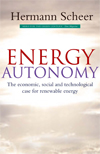 Speech by Dr. Herman Scheer, MP, General Chairman of the World Council for Renewable Energy (WCRE) at the ACORE Conference Renewable Energy in America, Washington, December 7th, 2004
Speech by Dr. Herman Scheer, MP, General Chairman of the World Council for Renewable Energy (WCRE) at the ACORE Conference Renewable Energy in America, Washington, December 7th, 2004The Watershed between Conventional and Renewable Energies
Our world is faced with an ongoing energy crisis. Its origin lies in the dependency on energy sources, which do not offer a future, because they are limited and restrict more and more the quality of life of the people, the world economy, and the access to energy. Moreover, the dominating fossil and nuclear energy system absorbs too much of the water potential and contributes to the ongoing water scarcity in more and more regions which is exacerbating the vulnerability of our societies. And it endangers the climate of our globe. All these dangers would not exist on a Renewable Energy basis.
There are three basic differences between Non-Renewable and Renewable Energies:
1. Renewables are in balance with nature; Non-Renewables are not.
2. Renewables are not exhaustible; Non-Renewables will be exhausted soon.
3. Renewable Energy sources are everywhere; the reserves of Non-Renewables can be found at very few places of our globe.
The specific characteristics of every energy source determine political, economic, social and cultural developments. These particular characteristics are crucial for the selection of the specific extraction-, mining- or harvesting-technology. They determine the choice of the technology employed for conversion, transportation and distribution and of the infrastructure. The energy flow creates the distinct shape of the energy systems and decides over being dependent or independent, war or peace.
The flow of fossil and nuclear energy has to bridge wider and wider distances for more and more countries. The three main nations of the world economy – the US, Japan and Germany – have nowadays an energy dependency of 55%, 94% and 80% respectively. This structure leads to higher and higher foreign currency expenses in the run of rising primary energy prices. Some “Third World” Countries’ total export revenues are still lower than the amounts they pay for the import of oil.
The only opportunity to free oneself from these bonds is to shift to indigenous Renewable Energy sources with short energy flows. The political and economic rationality of Renewable Energies is to avoid the costs and the increasing costly political dangers for long power lines.
Renewable Energies create a new and stable energy system. To promote them is not a single issue-matter, it is an all issue-matter. Higher investment costs for Renewable Energies today mean less macro-economical, security and environmental protection costs and lower energy costs for everybody in the future. The political criterion for promoting Renewable Energies is the transformation of their already existing macro-political and macroeconomic benefits into microeconomic incentives for investors and costumers.
Each strategy remains to be just a paper tiger if there are no protagonists for the implementation. The main question is: who should and can do the job? Where is the human potential to use the potential of Renewable Energy and its technologies? Many agree that Renewable Energy is the future. But there are too many lip services and too many who say that Renewable Energy promotion should not be their job but the job of others.
I would like to tell you the story about four people named “everybody”, “somebody”, “anybody” and “nobody”:
There was an important job to be done and
everybody was sure that somebody would do it.
Anybody could have done it, but nobody did it.
Somebody got angry about that, because it was everybody’s job.
Everybody thought anybody could do it,
but nobody realized that everybody would not do it.
It ended up that everybody blamed somebody
when nobody did what anybody could do.
I appreciate that with the American Council on Renewable Energy (ACORE) you have a driving force in your country, driven personally by the un-fatigable work of Michael Eckhart. Thank you very much, Mike, you have a lot of renewable human energy!
Based on the experiences everywhere in the last 30 years, my recommendations are:
- Don’t leave the job only to the conventional energy system. Because they are prisoners of their own structures. New energies require new protagonists!
- Don’t leave the job only to the market. A fair market requires equal market conditions, which do not exist because of trillions in subsidies, which were - and still are - spent for nuclear and fossil energies, directly and indirectly. It is not the so-called invisible hand of the present market that will lead us into the energy future, but the visible hand of the sun.
- Don’t wait for consensus among all participants. The replacement of conventional energy systems with Renewables is a race against time. Activities guided by consensus are impeded in their speed by the slowest mover. If all speak unanimously, the text has no substance. There is a big difference between fast speed and consensus. The alternative to consensus is leadership.
- Secure the support of the people. Tell them the truth about the real costs of conventional energies. Create confidence for Renewable Energy, because the main psychological barrier is that people do not believe that Renewable Energy can be an alternative. When people become aware of the real potential of Renewable Energy, they will become supporters.
- Inspect different strategies. Check which ones succeeded and which ones did not and choose the real successful concepts. I have my very well reasoned doubts about the Renewable Energy Portfolio Standard (RPS) and even emission trading concepts. The problem is that emission trading concepts do not take into account the other motivations for Renewables – like the creation of new jobs, saving water, new promotion of agricultural and energy security. They reduce these broad motivations into only one. It could never be the only decision-making-criterion. The German Renewable Energy Act for the Electric Power Sector became the most successful (in speed and quantities), because we decided not to go the way of the RPS or another Renewable Energy certification market concept.
Within only a few years we got 17000 MW of new Renewable Energy capacities, not including large hydro. The new annual installation rate is now 3000MW. That means: It substitutes annually 1.5% of the conventional power supply. If this process continues, the figures will be as follows: 47,000 in 2015, 77,000 in 2025, 107,000 in 2035 and 137,000 in 2045.
This could substitute the already working conventional capacities of 70,000 MW totally in my country. This means that we have shown that within 40 years a purely Renewable Energy electrical power system is possible. On the way to this goal the conditions for Renewable Energy will improve more and more by technological development, including new storage technologies, avoided infrastructure costs, a decline in cost by more construction – and because the sun and the wind do not send us an energy bill. Renewables become continuously cheaper; the conventional energies will become more and more expensive.
The Renewable Energy Act which made this very promising development possible consists of two elements:
- A guaranteed access to the grid for all Renewable Energy power producers without any discrimination.
- A legally guaranteed feed-in-minimum price for each kwh, differentiated between the diverse Renewable Energy options.
It is not the entire contemporary additional costs for Renewables that are covered by the state budgets. They are balanced by the customers on an average level – and they are roughly 1 euro per month for each household. People accept it, because we informed them about the benefits for everybody and for our future, and they understand it. 80%-90% of the people want to continue with this policy that is based on parliamentary initiatives, pushed by Renewable Energy associations, mainly EUROSOLAR.
At no time did we have a consensus with the energy companies. They were resisting – and still are – and already try to undermine its implementation, by
- using their traditional ties to the departments of the government,
- denouncing the higher costs,
- claiming that this policy would affect the market principle,
- organizing media campaigns,
- accusing us at the supreme courts of Germany and the European Union.
But the Parliament withstood these resistances. Moreover: we are having more and more support by interest groups, which benefit from this change. One year ago we had a huge manifestation of people in front of the Parliament supporting the Renewable Energy Act, carried jointly by Renewable Energy Associations, Environment groups, the Farmers Associations, the Industry Associations of small and medium enterprises, and by the labor unions in the metal and the buildings construction industry. Never before has such a civilian alliances existed, bringing together different social groups with different positions for a new common goal.
The situation in Europe shows a clear picture:
- Wherever – Germany, Spain – our guaranteed feed-in-concept became the legal framework, the acceleration of Renewable Energy and of new industries happened,
- Wherever the RPS-system was introduced, there is a very slow progress and only small industries for Renewable Energy were developed.
Germany has installed 20 times more new Renewable Energy than the UK and we have lower prices for Renewable Energy, although the wind conditions are worse.
Our European experience shows: not everybody who favors the RPS concept is against Renewable Energy. However, those who want to postpone Renewable Energy do favor the RPS concept against our concept in order to slow down the introduction of Renewable Energy. Our concept of feed-in-tariffs resulted in the creation of a technology market for Renewable Energy instead of looking only at the kwh-market. This is the promising concept for Renewable Energy because – with the exception of biomass – its costs are expenses for the technology and not for fuels.
Besides, we launched for the transport-fuel-needs a 100% tax-free for all bio-fuels, in order to make them cheaper than fossil fuels. For the solar heat acceleration I recommend the way the Spanish government has taken: a legal obligation to apply solar heat systems in all new and reconstructed buildings.
My recommendation not only as a German Parliamentarian, but mainly as the chairman of the World Council for Renewable Energy is: try to take the best examples for America, and try to do it better.



